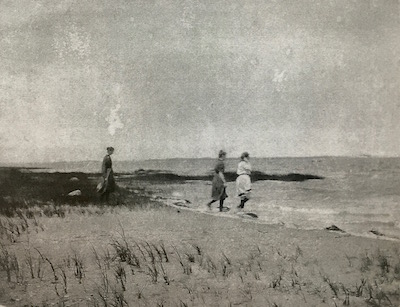I went to Cape Cod a few weeks ago to see how much remained of the Barnstable that Emilie Loring knew when she lived there. Of course, that was 1889-91, and she was Emilie Baker then. Her father and brother were ill, so the Bakers closed up their Boston house and rented a home in the clean, fresh air of the Cape.

My 2016 rental was a suite of rooms through Airbnb, but they were in a home that was already old when Emilie lived in town, and they felt just right. I didn’t rent a car; I see more and get to know a place better on foot.
Luckily for me, Barnstable celebrated its 250th anniversary in 1889, and many photographs were taken in celebration of the milestone. For several days, I walked up and down Barnstable streets, comparing present-day sights to photos in my collection and in the Sturgis Library archives. This tour is the result–what Emilie saw and what you will see today, if you take a walk through Barnstable.
Pleasant farms, neat cottages, and fine home-like mansions,
With many an ancient Colonial abode,
The hills are all stately, symmetrical and beautiful,
Forming picturesque settings for the town and the road.
from “Barnstable” by Phebe T. Chamberlain, 1912
When the Bakers arrived, a brand-new railway station sat at the foot of their road, Jail Lane.

As soon as they alighted, they could see their home, high on the hill ahead. (See that smudge on the horizon in the photo below?)

The home had been used by Episcopal nuns as a healthy, vacation camp for poor and sick children from Boston. Its rooms were spacious and airy, and a piazza wrapped all the way around for even more access to fresh air.
The Barnstable Patriot reported that the Bakers gave the place a “showy” appearance. They painted it, got rid of the chickens and coops, ordered a piano, and bought a new carriage and horses. Before long, they were organizing plays for the public.
I knew already that their home was gone, but I wasn’t prepared to find that much of the hill it was on had been leveled for a housing development. Through the trees, I spied one of the original, stone fences. That would have to do.

At the end of Jail Lane, I turned right onto Main Street, which is present-day Highway 6A. Old homes with black-banded chimneys and shrubs blooming atop old, stone fences took me back to Emilie’s day.
Ahead on the left was Mary Cobb’s house. We met Mary in Find Your Fortune in a Pleasant Cup of Tea. She acted with the Bakers in “To Oblige Benson” at the Masonic Hall in Hyannis. She also kept a scrapbook with poems that she wrote herself. “Ballad of a Blighted Being” is girl-talk put down on paper. Mary was between Emilie and Rachel Baker in age. I wonder if they got together and talked about these things?
I don’t know why I shouldn’t flirt like other girls and yet
Somehow, when I attempt to dally or court,
the efforts seem to fill the world
with wonder and amaze!
Oh! dear, I only wish I had
some little witching ways.

Next to Mary’s house was the Sturgis Library. Imagine how eleven thousand books were kept here in 1891.
The original railroad depot was on, yes, Railroad Avenue. It’s easy to see how Barnstable’s businesses clustered near it. The newspaper office came first, and where the avenue met Main Street was the Globe Hotel.

Emilie stayed at the Globe from time to time, and I had a pleasant meal there, myself, although it’s the Barnstable Restaurant and Tavern now. The courthouse across the street was vintage, but the view eastward was nothing like Emilie would have seen.

In 1890, the Bakers moved to Crescent (now “Bow”) Lane. By a stroke of both good fortune and great kindness, I met the current owners who allowed me to walk about the property and come inside for a quick tour. So much was original–wide, pumpkin-pine floors; marble fireplaces, curved stairways at front and back…
I stood in the parlor and imagined Emilie looking out the window toward the road, her grief when her father died in this house, how different Barnstable was from what she had known in Boston.

The Unitarian Church that Emilie attended burned down, but another took its place. It stands at the corner of Main Street and the Hyannis-Barnstable Road, a two-minute walk from the Bakers’ house on Crescent.

Millway Street intersects Main, passes the church and cemetery, crosses the tidal marsh of Maraspin Creek, and leads on to the Barnstable Harbor.


A short distance beyond is a beach that looks across the harbor toward Sandy Neck and its lighthouse.

It takes no effort at all to imagine Emilie walking from her home to the beach to watch the yachts and sailing craft, to swim, and to picnic on the beach.

I love this last photo. It reminds me of an impressionist painting, but it’s real.

This was my third trip to Barnstable, and it was the best, because it finally felt like Boston and Blue Hill do to me: a place connected to Emilie Loring, that lives in the present but breathes out memories from the past. Take your imagination along when you visit; I feel sure you’ll find the same.




















What a lovely place! That house is gorgeous. It is amazing how much places can stay the same, the same streets, same houses, same views. Thanks for sharing your travels with us!
LikeLiked by 1 person
They were so kind. They had a brand-new infant and had never heard of me until fifteen minutes before, but I was welcomed into their home. Sometimes things work out in ways that feel blessed.
LikeLike